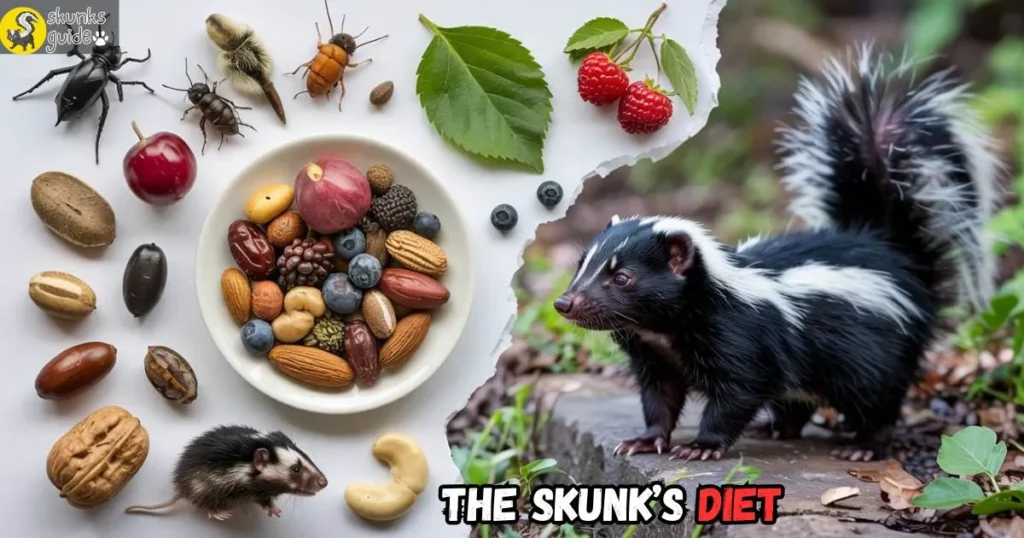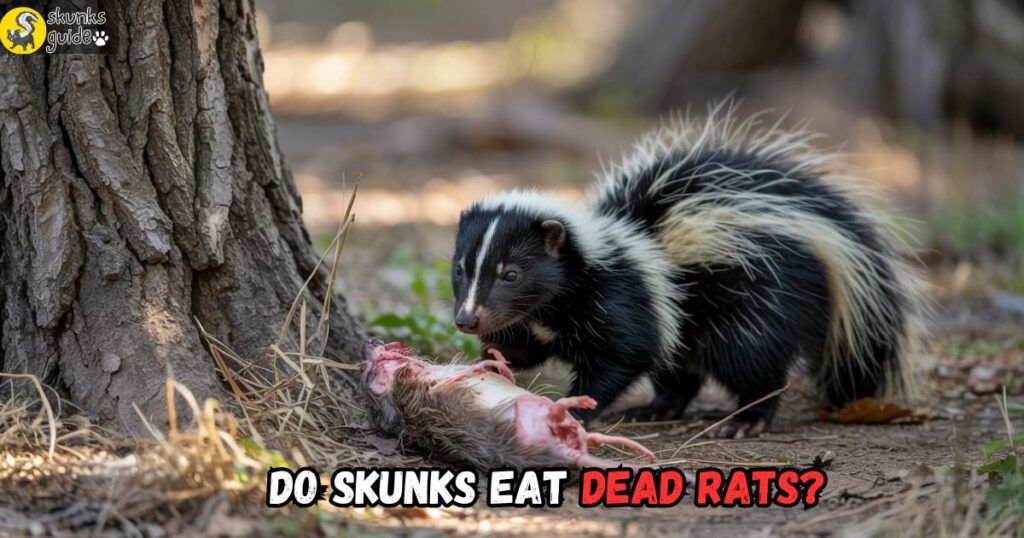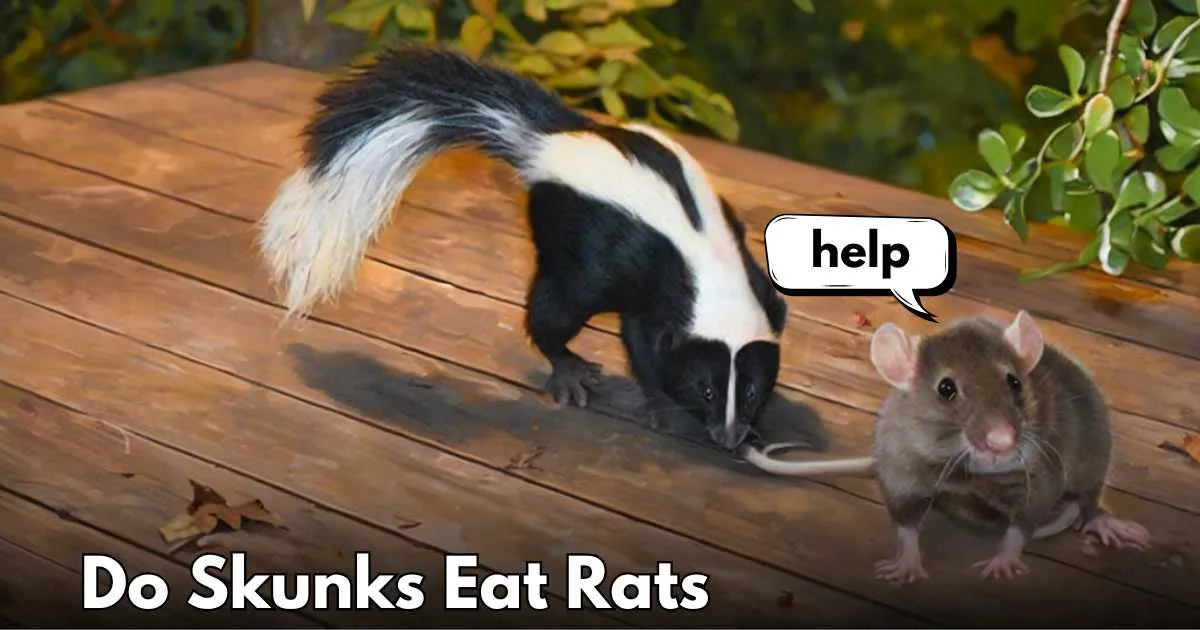Do Skunks Eat Rats?? Exploring Their Diet
Last updated on June 24th, 2025 at 11:26 pm
Yes, skunks do eat rats. As opportunistic omnivores, skunks will hunt small rodents like rats, mice, and voles when available. They primarily rely on their strong sense of smell to locate prey and use their sharp claws and teeth to capture and kill them.
In the wild, rats are a high-protein meal and an essential part of a skunk’s natural diet, especially in colder months when insects and fruits are less available.
The Skunk’s Diet

Omnivorous Nature:
Skunks adapt their eating habits to what’s available in their environment. They enjoy a wide range of foods, including:
- Insects: Beetles, grubs, and crickets are staples.
- Fruits and Berries: Seasonal produce like berries and fallen fruit.
- Plants and Nuts: Seeds, nuts, and certain leaves round out their diet.
- Small Mammals: Mice, voles, and on occasion, rats.
This dietary flexibility is key to their survival. By not relying on just one food source, skunks can thrive in diverse habitats, from rural woodlands to suburban gardens.
Why Do Skunks Eat Rats?
Rats are a convenient, high-protein food source, especially in environments where garbage, food waste, and rodent populations are high.
| Reason | Explanation |
|---|---|
| 🧠 Opportunistic Foragers | Skunks eat what’s available—rats, mice, insects, fruits |
| 💪 High in Protein | Rats support energy needs during cooler months |
| ❄️ Winter Survival | Fewer fruits/insects = more reliance on rodents |
❗ Note: Skunks do not rely exclusively on rats, but they help control rodent populations naturally.
Hunting and Foraging Behavior
Nocturnal Predators:
Skunks are mostly active at night, using their keen sense of smell and their sharp claws to find and catch prey. Rats, being nocturnal as well, sometimes share the same active hours. Although rats are quick and cautious, a skunk’s patient prowling might pay off.
Adaptability:
Skunks aren’t specialists in hunting small mammals, but their adaptability helps them succeed. If a rat’s burrow is disturbed, or if a rat is ill or slow, a skunk can easily capitalize on this vulnerability.

Do Skunks Kill Rats Around Homes?
Yes, especially if:
- Food is left outside (pet food, garbage)
- You live near wooded or abandoned areas
- There’s rodent activity nearby
However, this doesn’t mean skunks should be used as a pest control method. While they do reduce rat populations, they can bring their own problems (odor, digging).
Do Skunks Eat Rats in the Winter?
Yes. During colder months, when insects and fruits are scarce, skunks are more likely to hunt rodents like rats and mice. In snowbelt states, skunks often seek shelter near homes—bringing them closer to rodents.
🧠 Related: Do Skunks Eat Rodents? Full Guide
🐁 Do Skunks Eat Rats and Mice?
Yes, both. Skunks don’t differentiate—if it’s small and edible, they’ll eat it. This includes:
- Rats
- Mice
- Voles
- Shrews
🧠 Also read: Do Skunks Eat Mice?
🧟 Do Skunks Eat Dead Rats?
✅ Yes — but with risk.
Skunks are opportunistic and may scavenge dead rats, but this behavior is risky due to:
- 💀 Rodenticide poisoning
- 🦠 Parasites and bacteria
- 🧫 Spoiled meat toxins
If you see a skunk with a dead rat, it’s likely scavenging, not hunting.
🧠 Are Skunks Good Natural Rat Control?
Somewhat.
While skunks do eat rats and can help reduce rodents indirectly, they are not dependable pest control. Unlike cats or owls, skunks:
- Hunt sporadically
- Are omnivores, not specialists
- May cause property damage or spray pets
Do Skunks Eat Dead Rats?

Yes, but it’s risky.
Skunks will sometimes scavenge — including on dead rats — but this behavior can expose them to disease, poison, or parasites, especially if the rat died from rodenticide.
Do Skunks Eat Rats in California?
Yes, California skunks eat rats commonly in urban and suburban areas. Skunks thrive in regions like:
- Los Angeles
- San Diego
- Bay Area suburbs
Due to warmer weather and higher rodent populations, California skunks are frequently spotted hunting rats around trash bins, crawl spaces, and yards.
Frequently Asked Questions
Skunks do not typically target rats as their primary prey. They’re more likely to hunt insects and eat fruits. However, if a skunk encounters a rat, it will seize the opportunity.
While not a foolproof method, skunks can help control rat populations. Their presence and occasional predation can reduce the number of rodents in an area.
Skunks generally avoid conflicts with humans. They use their spray as a last resort. If you see a skunk, give it space and do not approach it.
Conclusion
Skunks are adaptable omnivores whose dietary habits extend beyond insects, fruits, and trash scraps to include small mammals like rats. Although rats aren’t their favorite meal, skunks do eat them when it’s advantageous. This opportunistic feeding behavior plays a subtle yet valuable role in managing rodent populations and maintaining ecological balance. By understanding what skunks eat—and why—we gain a deeper appreciation for these often misunderstood creatures and their place in the natural world.

